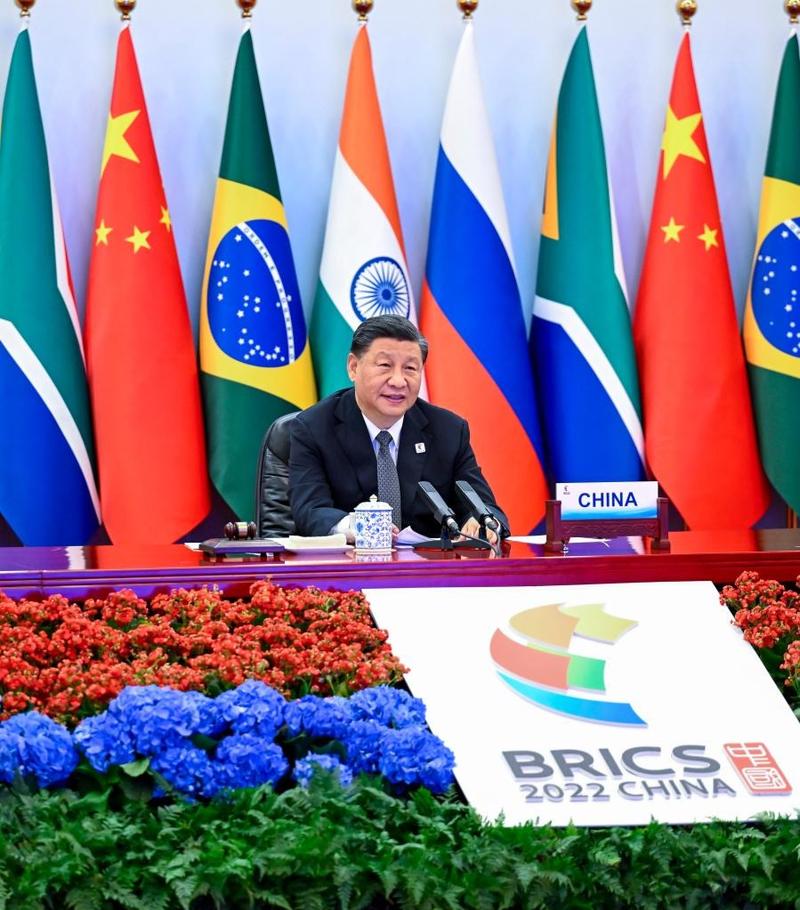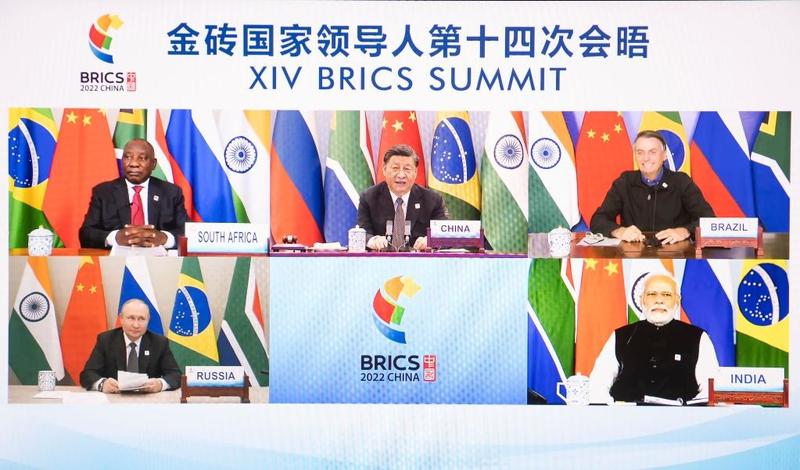 Chinese President Xi Jinping delivers remarks titled "Fostering High-quality Partnership and Embarking on a New Journey of BRICS Cooperation" at the 14th BRICS Summit in Beijing, China, June 23, 2022. (LI XUEREN / XINHUA)
Chinese President Xi Jinping delivers remarks titled "Fostering High-quality Partnership and Embarking on a New Journey of BRICS Cooperation" at the 14th BRICS Summit in Beijing, China, June 23, 2022. (LI XUEREN / XINHUA)
HONG KONG – More practical and inclusive BRICS on its new journey of comprehensive cooperation as expounded by Chinese President Xi Jinping will positively contribute to global governance for a better shared future of mankind, according to analysts.
And a closer high-quality partnership of BRICS countries can also help the world overcome common challenges including the COVID-19 pandemic and achieve the UN's 2030 Agenda for Sustainable Development.
BRICS comprises the major emerging economies of Brazil, Russia, India, China and South Africa. Together with other state leaders of the group, President Xi has highlighted these themes in his speeches at the 14th BRICS Summit.
Swaran Singh, a professor of diplomacy and disarmament at Jawaharlal Nehru University in India, described Xi’s speech at the BRICS summit on June 23 as “subtle, broad based, and philosophical”.
READ MORE: Full text of 14th BRICS Summit Beijing Declaration
“The significance of the 14th BRICS Summit lies in this being the most potent grouping of ‘emerging economies’ that, led by China, have been the locomotive of the post-pandemic resilience in the global economy and healthcare relief,” he said.
Unlike Western countries, cooperation between BRICS actors is increasing and new international alternatives are created. This year’s summit is among the important indicators of this.
Deniz Istikbal, Researcher, Foundation for Political, Economic and Social Research
He said that the BRICS Summit being hosted in China, at this juncture, only reinforces its centrality in global manufacturing and supply chains, “making it pertinent that emerging economies work with China to reinforce their complementarities to democratize global economic decision making and enhance global economic benefits”.
According to Singh, the Bretton Woods institutions – especially the International Monetary Fund and the World Bank that were set up to promote global economic cooperation after World War II – have a great deal to learn from the BRICS’ structures and processes.
Xi's keynote speech at the opening ceremony of the BRICS Business Forum on June 22, once again expressed China’s unique view of global development, which values harmony, inclusiveness, peaceful development, mutual benefits as well as win-win solutions, and jointly building a community with a shared future for mankind, said Professor Gu Qingyang, associate professor of the Lee Kuan Yew School of Public Policy at the National University of Singapore.
BRICS represents more than 40 percent of the world’s population and more than 20 percent of its total economic output, and it plays a key role in maintaining regional and global economic stability, and supporting the growth of the digital and green economies, Gu said.
As Xi stressed in both his speeches on June 22 and 23, the collaboration among BRICS members is of particular importance, considering that the current stage of global development is heavily impacted by the COVID-19 pandemic, he noted.
“This plays a positive and constructive role in alleviating the impact of the pandemic, food and energy shortages, debt crises, and aggravation of poverty in emerging markets and developing countries,” Gu said. “(BRICS members) should work together to open a new era of global cooperation and development.”
Deniz Istikbal, an economic researcher at the Foundation for Political, Economic and Social Research, a policy think-tank based in Ankara, Turkey, said that international cooperation should be increased in order to solve the crises in food, energy and supply chain management.
Istikbal added that the 14th BRICS summit marks an important threshold for the global economy.
In his speech at the BRICS Business Forum, “President Xi also drew attention to the current situation and pointed to the UN’s Sustainable Development Goals’,” he said.
“Unlike Western countries, cooperation between BRICS actors is increasing and new international alternatives are created. This year’s summit is among the important indicators of this.”
ALSO READ: China working with BRICS nations to combat pandemic
Glenn Wijaya, an adviser to the Centre for Indonesia-China Studies said the most important points from Xi’s speech on June 23 include the emphasis on the need for BRICS nations to assist all developing countries in accelerating the development of the digital economy, green transformation, as well as cooperation on the response to COVID-19.
“I sincerely agree that these are critical pillars if the world is serious about achieving the 2030 Sustainable Development Goals,” he said.
 President Xi Jinping hosts the 14th BRICS Summit via video link in Beijing, China, June 23, 2022. South African President Cyril Ramaphosa, Brazilian President Jair Bolsonaro, Russian President Vladimir Putin and Indian Prime Minister Narendra Modi attended the summit. (LI TAO / XINHUA)
President Xi Jinping hosts the 14th BRICS Summit via video link in Beijing, China, June 23, 2022. South African President Cyril Ramaphosa, Brazilian President Jair Bolsonaro, Russian President Vladimir Putin and Indian Prime Minister Narendra Modi attended the summit. (LI TAO / XINHUA)
Wijaya noted that the substantial SDG objectives can only be realized via strong collaboration and not by “creating little yards with high walls”.
“I hope that cooperation between BRICS nations can spread to other non-core members, such as Indonesia,” he added.
Gu from the NUS noted that amid the backdrop of globalization being negatively affected by geopolitics, the collaboration between enterprises located in different countries is especially important. “It pays more attention to mutual benefit, gives more respect to economic laws and cares more about social needs,” he said.
“Strengthening collaboration among international enterprises is conducive to avoiding geopolitical interference and bringing development back to the center of the world,” Gu added.
Singh said that the last decade has also seen BRICS members steer clear of geopolitical rhetoric, and emerging as a group that is focused on technical initiatives.
He said this approach has greatly enhanced BRICS’ credibility and also strengthened their respective domestic constituencies along with the gradual enhancement of mutual trust among the BRICS members.
READ MORE: BRICS summit sets stage to promote both global development and security
“The fact that this summit of BRICS will be discussing plans to add new members from among G20 economies promises to be their morale booster and multiply its leverage as also centrality to global governance, especially in global transactions and trend setting,” Singh added.
India is the second largest economy and the fastest growing economy among the BRICS, he noted. “Both China and India – the two leading economies of the BRICS group – have played a commendable role in extending help to much of the developing and least developed countries,” said Singh.
“Guided by the traditions of the Global South, both China and India reflect a kind of coordination where their assistance, advise and material supplies to needy nations during the pandemic were not seen to compete or undercut but complement each other.”
Gu also said he supports the expansion of BRICS. He noted that to make the group more representative, for example, BRICS can include some countries from the Middle East or those at different stages of development.
He said this could help with the economic growth of developing countries, and offer a common platform that could bring more cohesion and unity among these countries.
Contact the writers at vivienxu@chinadailyapac.com


